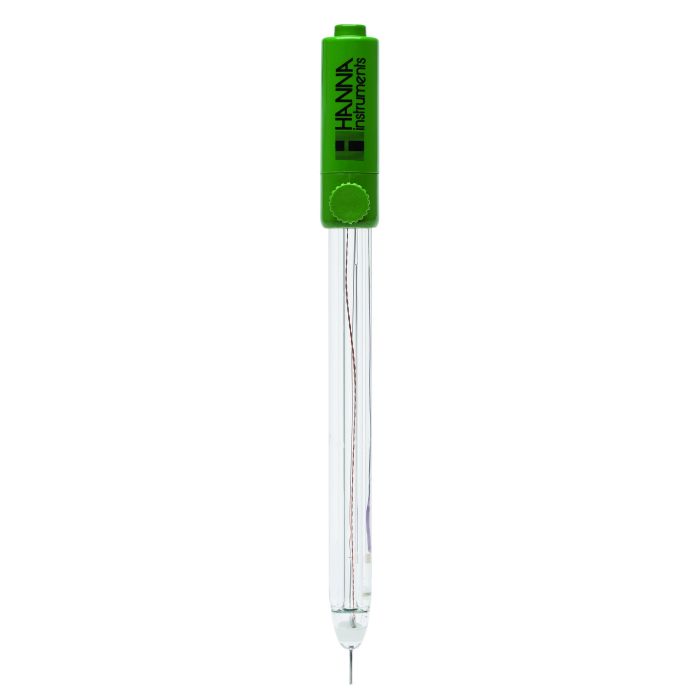Digital ORP Electrode for General Purpose - HI36180
The HI36180 is a glass body, double junction, refillable digital ORP electrode with a built-in temperature sensor for temperature compensated measurements. This electrode has a single ceramic junction and the ORP sensing pin is made with platinum. The HI36180 electrode features a built-in microchip that stores sensor type, serial number, and calibration information. This probe connects to the meter with a 3.5 mm connector. The 3.5 mm connector is proprietary to meters that use digital electrodes. This design consideration is ideal for laboratories and general purpose ORP measurements.
- Built-In Microchip
- Platinum Sensing Pin
- 3.5 mm Connector
Hanna Instruments offers a wide variety of ORP electrodes that are designed for many different applications. The type of material used for the sensing pin, type of glass used for the body material, type of junction, type of reference and electrolyte used are just some of the design considerations. The HI36180 features a platinum sensing pin, glass body, double junction reference and is refillable with 3.5M KCl.
Built-in Microchip
The built-in microchip stores sensor type, serial number and calibration information including date, time, offset, slope, probe condition and buffers used. This information is automatically retrieved by edge® once the electrode is plugged in. The ability to transfer information allows for hot-swapping of probes without having to recalibrate. All pH measurements are performed within the electrode and transferred digitally to the meter. This overcomes any noise issues associated with the traditional high impedance analog measuring system. Electrical noise can be generated from a built-in temperature sensor and while working in a humid environment.
Platinum Sensing Pin
The HI36180 ORP sensor is made with platinum. An ORP sensor must be chemically inert; it cannot be oxidized or reduced itself. It must also have the proper surface characteristics to promote rapid electron exchange, a property known as high exchange current density. Two noble metals have proven to work well for this purpose: pure platinum and pure gold are both used in the construction of ORP sensors. The platinum sensor is often preferred because it is mechanically simpler and safer to produce. Platinum can be welded to glass and has the same thermal coefficient. The platinum sensor signal is carried through the electrode body, and together with the reference signal is conducted to the measurement meter.
Glass Body
The glass body is ideal for laboratory use. The glass is resistant to many harsh chemicals and is easily cleaned. The glass body also allows for a fast transfer of heat to the internal reference electrolyte. The mV generated by the reference cell is temperature-dependent. The faster the equilibrium the steadier the reference potential.
Double Junction Reference
A double junction electrode has an internal compartment surrounding the reference wire. Silver ions are present in the electrolyte of the internal compartment, which houses the Ag/AgCl reference wire; the electrolyte outside this compartment is silver free. The double junction design means that virtually no silver from the electrode enters the sample. This design allows measurement in applications where silver ions in the sample are undesirable or silver precipitates on the junction are likely to form.
Refillable
The HI36180 is a refillable probe. Since it is a double junction ORP electrode the fill solution is the HI7082 3.5M KCl. If using a refillable ORP electrode, the fill cap should be removed prior to measurement. Removing the cap creates positive head pressure in the reference cell allowing for a higher flow rate of electrolyte through the outer junction. A higher flow rate will result in a faster and more stable reading.
Built-In Temperature Sensor
HI36180 features a built-in thermistor temperature sensor that is in the tip of the indicating pH electrode. A thermistor temperature sensor provides for a high accuracy temperature reading and should be as close as possible to the indicating pH electrode in order to compensate for the effect that temperature has on the membrane potential. By having an accurate reading it is possible to provide an accurate temperature-compensated reading.
Specifications
|
Body Material |
Glass |
|
Reference |
single, Ag/AgCl |
|
Junction/Flow rate |
ceramic, single / 15-20 µL/h |
|
Electrolyte |
3.5M KCl + AgCl |
|
Range |
ORP: ±2000 mV |
|
Max. pressure |
0.1 bar |
|
Tip shape |
platinum pin |
|
Recommended Operating Temperature |
-5 to 100°C (23 to 212°F) |
|
Temperature sensor |
yes |
|
Matching Pin |
No |
|
Amplifier |
Yes |
|
Digital |
Yes |
|
Cable |
7-pole; 1 m (3.3') |
|
Connection |
3.5 mm connector |
|
Applications |
laboratory general purpose |
| Fast Shipping | No |
|---|

